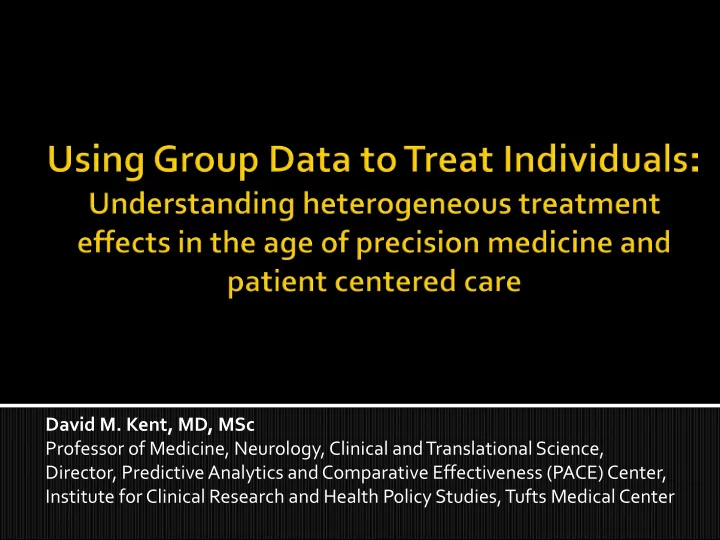

David M. Kent, MD, MSc Professor of Medicine, Neurology, Clinical and Translational Science, Director, Predictive Analytics and Comparative Effectiveness (PACE) Center, Institute for Clinical Research and Health Policy Studies, Tufts Medical Center
Person-level heterogeneity of treatment effects (HTE) are ubiquitous Group-level HTE is rarely reliably identifiable in clinical trials.
Weak Theory (poor prior knowledge about effect modifiers) Noisy Data (Low power) Patients have too many attributes
David M. Kent, MD, MSc Professor of Medicine, Neurology, Clinical and Translational Science, Director, Predictive Analytics and Comparative Effectiveness (PACE) Center, Institute for Clinical Research and Health Policy Studies, Tufts Medical Center
Risk is a known mathematical determinant of treatment effect.
Risk Reduction Definition (RR) Absolute RR EER-CER Relative RR 1 - EER CER Odds Ratio EER/(1-EER) CER/(1-CER) CER=control event rate EER=experimental event rate
Risk is a known mathematical determinant of treatment effect. When baseline risk heterogeneity is present (and the treatment effect is non-zero), there is always HTE. Risk provides a summary measure that takes into account multiple variables that are relevant; provides “patient-centered” evidence.
Kent DM, et al. J Gen Intern Med 2002; 17:887- 94.
Kent DM, et al. J Gen Intern Med 2002; 17:887- 94.
16.3% 1.0% Kent DM, et al. J Gen Intern Med 2002; 17:887- 94.
High Risk Low Risk Thune JJ, et al. Circulation 2005,112:2017-2021.
Kent DM et al. Int J Epidemiol. 2016 Jul 3. pii: dyw118.
Treatment effect heterogeneity on the proportional scale across patients at different baseline risk was rare
Substantial differences in absolute treatment effects were common Displaying results across subgroups defined by risk is feasible and can lead to clinically important findings
Participants: 3060 nondiabetic persons with evidence of impaired glucose metabolism. Intervention: Intervention groups received metformin or a lifestyle-modification program. Main Outcome Measure: Development of diabetes The DPP study was conducted by the DPP Investigators and supported by the National Institute of Diabetes and Digestive and Kidney Diseases (NIDDK).
p value = NS p value = 0.0008 Sussman JB et al. BMJ. 2015 Feb 19;350:h454. 16
Sussman JB et al. BMJ. 2015 Feb 19;350:h454. 17
Participants: Participants with HF and LVEF less than or equal to 45% (main DIG study, n=6800) or LVEF >45% (ancillary DIG study, n=988). Intervention: digoxin versus placebo Main Outcome Measure: Hospitalization due to worsening HF, all cause hospitalization
Upshaw JN et al. Am J Med. 2018 Jun;131(6):676-683.e2.
Upshaw JN et al. Am J Med. 2018 Jun;131(6):676-683.e2.
Participants: Smokers between the ages of 55 and 74 years with a minimum of 30 pack- years of smoking and no more than 15 years since quitting Intervention: Low-dose CT screening or chest radiography Main Outcome Measure: Lung-cancer deaths
Kovalchik SA et al. N Engl J Med 2013; 369: 245-54
Overall effectiveness results may be driven by a relatively small group of influential (typically high risk) patients; The typical (median) risk patient is frequently at considerably lower risk than the overall average; The average benefit seen in the summary result often over estimates the benefit (on the RD scale) in most patients (and may obscure harm in many).
CLINICAL CONDITION INTERVENTION Symptomatic carotid stenosis Carotid endarterectomy Non-valvular atrial fibrillation Anticoagulation for primary prevention of stroke Coronary artery disease Coronary artery bypass grafting Primary prevention of coronary artery Blood pressure lowering disease Aspirin Lipid lowering Acute coronary syndromes Early invasive strategy (versus conservative) Clopidogrel (versus placebo) Enaxparin (versus unfractionated heparin) ST-Elevation acute myocardial infarction tPA (versus streptokinase) Percutaneous coronary intervention (versus thrombolytic therapy) Severe sepsis Drotrecogin alfa (activated protein C) Pre-diabetes Lifestyle intervention Metformin Tobacco smoking Lung cancer screening Kent DM, et al. Trials 2010;11:85.
Heterogeneity of outcome risk is ubiquitous. Heterogeneity of outcome risk inevitably gives rise to heterogeneity of treatment effect. One variable at a time subgroup analyses are inadequate (and prone to spurious false positive results). Risk based subgroup analyses can do better.
Kent DM, et al. Stroke 2003;34:464-7.
Age Sex Race (white, black or other) History of prior stroke Systolic blood pressure Diastolic blood pressure Interaction term: age* gender* history of prior stroke Gurtwiz JH, et al. Ann Intern Med 1998;129(8):97-604.
Kent DM, et al. Stroke 2003;34:464-7.
Kent DM, et al. Stroke 2003;34:464-7.
31
Primary outcome (stroke and MI) at 4.8 years: Pioglitazone: 9.0% Placebo: 11.8% HR: 0.76; P=0.007 Pioglitazone was associated with serious bone fracture (5.1% vs. 3.2%, P=0.003). For each 100 patients treated, 2.8 primary events (stroke or MI) were averted 1.9 fractures primary events averted: fractures caused ratio =~1.5 32
33 Viscoli C et al. Stroke 2019 (In Press)
High Risk Low Risk 34 Viscoli C et al. Stroke 2019 (In Press)
35 Viscoli C et al. Stroke 2019 (In Press)
Evaluate and report on the distribution of risk in the overall 1. study population and in the separate treatment arms of the study by using a risk prediction model or index. Primary subgroup analyses should include reporting how relative 2. and absolute risk reduction varies in a risk-stratified analysis . Any additional primary subgroup analysis should be pre- 3. specified and limited to patient attributes with strong a prior pathophysiological or empirical justification. Conduct and report on secondary (exploratory) subgroup 4. analyses separate from primary subgroup comparisons. All analyses conducted must be reported and statistical testing 5. of HTE should be done using appropriate methods (such as interaction terms) and avoiding over-interpretation.
David Kent, MD, Tufts Medical Center Sally Morton, PhD Virginia Tech Ewout Steyerberg, PhD Leiden University MC Sharon-Lise Normand, PhD Harvard Medical School Blue Cross and Blue Naomi Aronson, PhD Michael Pencina, PhD Duke University Shield Association; Ralph D’Agostino, PhD Boston University Joseph Ross, MD Yale University Steven Goodman, MD, Stanford University Harry Selker, MD MSPH Tufts Medical Center Rodney Hayward, MD University of Michigan Ravi Varadhan, PhD Johns Hopkins University John P.A. Ioannidis, MD, Stanford University Andrew Vickers, PhD Memorial Sloan Kettering Bray Patrick-Lake, MFS Duke University John B. Wong, MD Tufts Medical Center
Recommend
More recommend